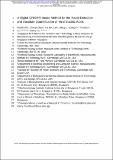Digital CRISPR-based method for the rapid detection and absolute quantification of nucleic acids
Author(s)
Wu, Xiaolin; Tay, Joshua K; Goh, Chuan Keng; Chan, Cheryl; Lee, Yie Hou; Springs, Stacy L; Wang, De Yun; Loh, Kwok Seng; Lu, Timothy K; Yu, Hanry; ... Show more Show less
DownloadSubmitted version (1.827Mb)
Publisher with Creative Commons License
Publisher with Creative Commons License
Creative Commons Attribution
Terms of use
Metadata
Show full item recordAbstract
Rapid diagnostics of adventitious agents in biopharmaceutical/cell manufacturing release testing and the fight against viral infection have become critical. Quantitative real-time PCR and CRISPR-based methods rapidly detect DNA/RNA in 1 h but suffer from inter-site variability. Absolute quantification of DNA/RNA by methods such as digital PCR reduce this variability but are currently too slow for wider application. Here, we report a RApid DIgital Crispr Approach (RADICA) for absolute quantification of nucleic acids in 40-60 min. Using SARS-CoV-2 as a proof-of-concept target, RADICA allows for absolute quantification with a linear dynamic range of 0.6-2027 copies/μL (R2 value > 0.99), high accuracy and low variability, no cross-reactivity to similar targets, and high tolerance to human background DNA. RADICA's versatility is validated against other targets such as Epstein-Barr virus (EBV) from human B cells and patients' serum. RADICA can accurately detect and absolutely quantify EBV DNA with similar dynamic range of 0.5-2100 copies/μL (R2 value > 0.98) in 1 h without thermal cycling, providing a 4-fold faster alternative to digital PCR-based detection. RADICA therefore enables rapid and sensitive absolute quantification of nucleic acids which can be widely applied across clinical, research, and biomanufacturing areas.
Date issued
2021Department
Singapore-MIT Alliance in Research and Technology (SMART); Massachusetts Institute of Technology. Center for Biomedical Innovation; Massachusetts Institute of Technology. Synthetic Biology Center; Massachusetts Institute of Technology. Research Laboratory of Electronics; Massachusetts Institute of Technology. Department of Electrical Engineering and Computer Science; Harvard University--MIT Division of Health Sciences and Technology; Massachusetts Institute of Technology. Department of Biological EngineeringJournal
Biomaterials
Publisher
Elsevier BV
Citation
Wu, Xiaolin, Tay, Joshua K, Goh, Chuan Keng, Chan, Cheryl, Lee, Yie Hou et al. 2021. "Digital CRISPR-based method for the rapid detection and absolute quantification of nucleic acids." Biomaterials, 274.
Version: Original manuscript